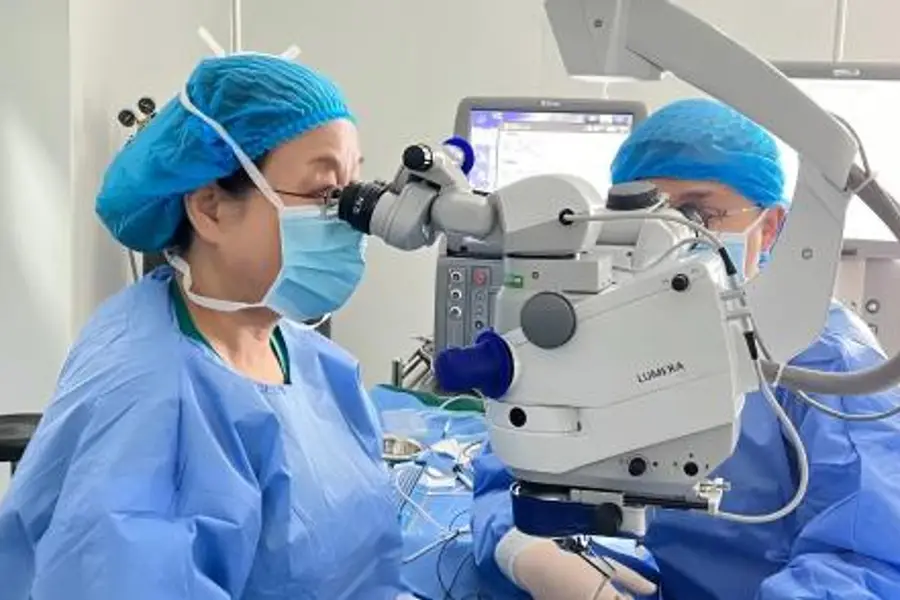Chaoju Eye Care preparing to re-enter acquisition mode?

The private hospital and clinic operator announced two new purchases, signaling a potential return to acquisitions after a quiet period last year
Key Takeaways:
- Chaoju Eye Care announced plans to buy out one of its majority-owned eye care facilities in Ningbo, and purchase 70% of another facility in the Ningxia region
- The company is trying to jumpstart its growth, as its revenue began to contract and its profit tumbled 30% in the second half of last year
By Doug Young
It ain’t easy being outside the Chinese national health system.
That’s a lesson that many operators of the thousands of private hospitals and clinics outside China’s national health plan have been learning lately, as they try to make money by providing elective services such as eye and dental care, and cosmetic surgery. But in a slowing economy like the current one, consumers are reining in their spending on such elective procedures that aren’t covered by China’s national medical insurance.
As their businesses stagnate and even start to contract, some companies are trying to bring excitement back to their stagnating stocks by growth through acquisitions. One of those is Chaoju Eye Care Holdings Ltd. (2219.HK), which on Monday announced plans to acquire two hospitals, one in the coastal city of Ningbo in East China’s Zhejiang province, and the other in the city of Wuzhong in the less developed Ningxia region in interior China.
Both acquisitions look aimed at getting investors interested in Chaoju, which hoped to position itself as a consolidator in China’s fragmented eye care industry at the time of its IPO back in 2021. Neither of these two deals looks all that exciting, for reasons we’ll explain shortly. But on a more symbolic level, they could indicate that Chaoju is back in acquisition mode after going more than a year without any major new purchases.
Perhaps reflecting how difficult it is to run such centers profitably, Chaoju isn’t paying all that much for the two facilities in its latest announcement. The larger of the deals will see Chaoju pay about 14 million yuan ($2 million) for 37% Ningbo Boshi Eye Hospital, valuing the facility at about 38 million yuan.
Here, we should point out that Chaoju already owned the other 63% of Boshi Eye Hospital, so it was already the facility’s majority shareholder and consolidated the hospital’s results into its financial reports. So, this particular deal isn’t even really an acquisition.
The second deal is an actual acquisition that will see Chaoju buy 70% of Wuzhong Yunshikang Eye Hospital for about 5 million yuan. That modest price values the hospital at just 7.14 million yuan, or around $1 million, which is hardly a mega-deal.
“These acquisitions form part of the company’s established strategic plan,” Chaoju said. “The company will continue to deepen its presence in the Zhejiang and Ningxia regions, strengthen its industry competitiveness through multi-point deployment, expand its market share, and effectively mitigate market risks.”
Chaoju announced the deals ahead of a Hong Kong public holiday on July 1, so we won’t get to see what shareholders thought until trading resumes on Wednesday. But we wouldn’t be surprised to see little or no reaction, since the combined deals are only worth 20 million yuan, or less than $3 million.
Lack of excitement
Such a muted reaction would mirror Chaoju’s broader recent performance, with the shares unchanged from where they started the year. Based in interior China’s Inner Mongolia region, the company looked more interesting at the time of its 2021 IPO due to its potential to help consolidate an industry set for strong growth. But since then it has largely disappointed, and the latest close of HK$2.85 for its stock is down more than 70% from its IPO price of HK$10.60.
Chaoju certainly isn’t alone in being shunned by investors, who are rapidly losing interest in such private hospital and clinic operators. The company’s current price-to-earnings (P/E) ratio of 9.2 looks quite low compared to other healthcare tickers from the drug and medical device sector. But it’s quite similar to the 9.9 ratio of Modern Dental (3600.HK), an operator of private dental clinics, as well as the 10 for Perfect Medical (1830.HK), which owns a chain of cosmetic surgery centers.
Chaoju looked a bit more interesting shortly after its IPO, when it embarked on a relatively aggressive buying spree as it moved beyond its home base in Inner Mongolia. The company operated 17 eye hospitals and 24 optical centers at the end of 2021, shortly after its listing, and had boosted that network with nine additions in 2022, including seven hospitals and two optical centers.
It continued that pace of expansion in 2023 with 10 additions, seven hospitals and three optical centers, bringing its network to 31 hospitals and 29 optical centers by the end of that year. But then its expansion suddenly came to a halt, with no new additions last year. The company announced plans to buy a Beijing hospital at the start of 2024, which would have been a relatively large purchase costing 36.8 million yuan. But that deal, involving the Beijing Mingyue Ophthalmic Clinic, apparently never closed, as the hospital wasn’t included in the company’s latest annual report released in April this year.
As its growth via acquisitions has stalled, Chaoju has also started feeling the effects of China’s economic slowdown. The company managed to eke out 2.6% revenue growth last year, as the figure reached 1.41 billion yuan. But calculations using the annual report and data for the first half of last year showed Chaoju’s revenue began to contract in the second half of last year, falling 0.9%, after growing 6% in the first half.
The company’s gross margin last year also fell by nearly 2 percentage points to 43.5% from 45.4% in 2023, reflecting shrinking profitability as patient numbers and average spending per customer came under pressure, even as its operating costs remained relatively unchanged.
As a result of that, its profit for all 2024 fell 12% to 186 million yuan from 221 million yuan a year earlier. And some calculations show that its profit fell by a far larger 30% year-on-year in the second half of 2024, compared with an 8.8% decline in the first half of the year.
Chaoju certainly has plenty of money for future acquisitions, reporting 781 million yuan in its coffers at the end of last year, up sharply from 463 million yuan a year earlier. The latest announcement could signal it’s preparing to use more of that cash to start making more acquisitions again. That could bring some excitement back to its stock if it finds good acquisition targets, though it will need to be careful to avoid assets whose financial positions may be shaky in the currently weak economic environment.
To subscribe to Bamboo Works free weekly newsletter, click here





